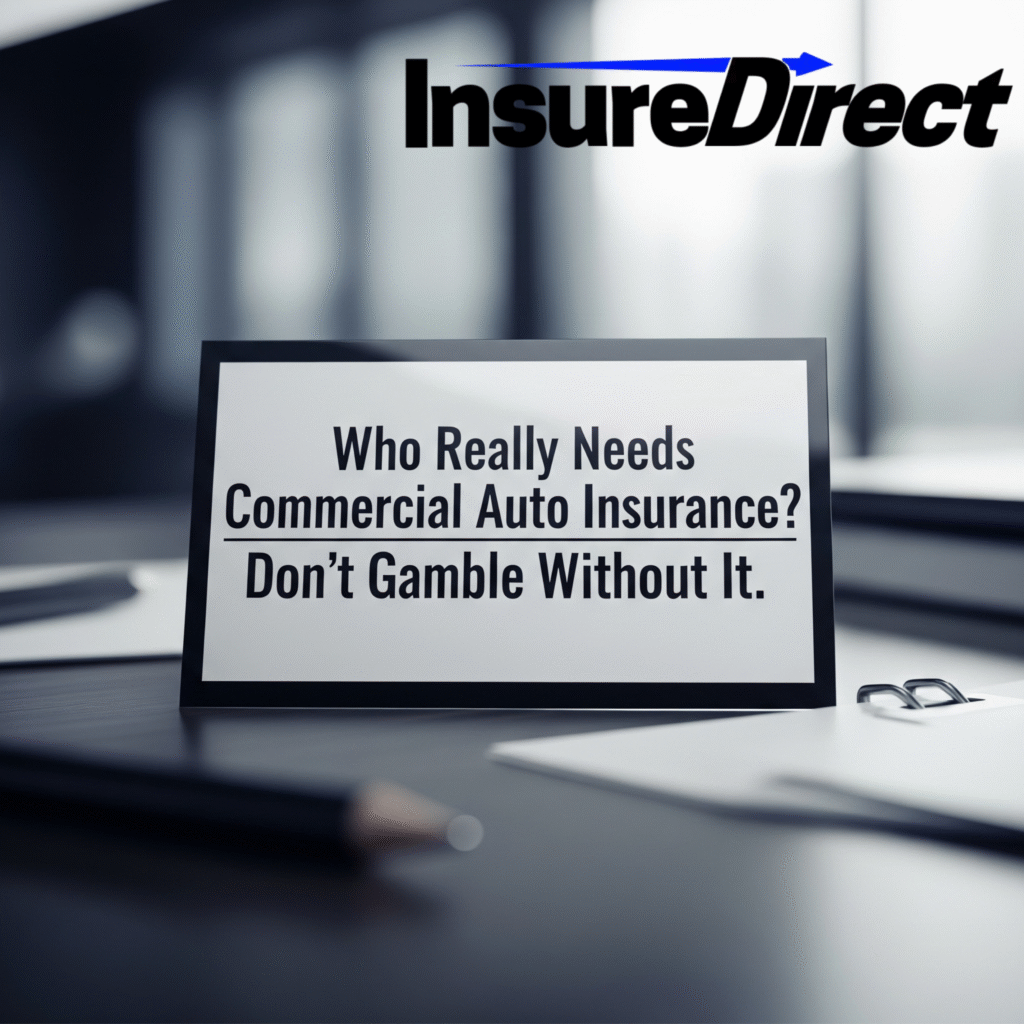For a moment, let’s face it: business moves quickly. These days, cars are more than just means of transportation; they are essentially coworkers on four wheels. You employ them for client visits, hauls, runs, and other tasks that keep your firm running smoothly.
The peculiar aspect? Most people don’t give insurance much thought until something goes wrong. Assuming my standard auto insurance would take care of everything, I used to roll that way as well. Yes, that was a huge error. I discovered how mistaken I was after one mishap.
Why You Could Be Let Down by Your Personal Auto Policy
The drawback is that business driving isn’t covered by personal insurance. Those rules apply to late-night snacking and supermarket errands, not package delivery or client visits. I discovered that the hard way.
Your personal coverage is unlikely to help if your car ever does “work things,” even minor ones. Insurance companies will say, “Sorry, that’s business use,” because they enjoy fine print.
Therefore, having adequate business vehicle coverage is ideal if you drive for work in any capacity, whether it is daily or once a week. Here’s how to determine whether it applies to you.
Companies That Must Have It
1. Business automobiles? Not a doubt.
You’re in commercial territory if your company owns, leases, or rents a vehicle. Personal coverage is nullified once it is registered under the business name, regardless of whether it is a van, truck, or some sort of Frankenstein delivery outfit.
Consider delivery drivers, food trucks, plumbers, nonprofit organizations, contractors, and pretty much anybody else who operates a vehicle for work.
2. Workers Operating Their Own Vehicles
This one surprises a lot of people. You’re vulnerable even if your firm doesn’t own cars if staff members use them for work-related purposes, including going to client meetings or doing errands. Work errands are rarely covered by personal insurance.
Let’s say your sales representative is involved in an accident in between visits. Who is the issue? Yes, yours. “Hired” or “non-owned” motor insurance can be helpful in this situation. Ask about it, please, before you regret not asking.
3. If the Business Is Driving
If the wheels stop turning, so does the money from food delivery, ridesharing, courier services, mobile grooming, and relocation companies. At that point, commercial insurance is not only wise, but required in the majority of jurisdictions.
Usually, larger coverage limits are also required. When property or injuries are involved, a little collision can quickly escalate into a financial disaster.
4. Do You Have Equipment or Tools in the Back?
This one is missed by many. It’s business usage if you’re transporting goods, equipment, or even props for your side project. Personal insurance just cares that it is for work, and that is sufficient to reject a claim. It doesn’t care what you are carrying.
Imagine a carpenter with saws in the trunk, a DJ with speakers, or a florist with arrangements. If that describes you, then yes, whether you like it or not, you are in commercial territory.
5. Frequently Leasing or Renting Cars
Have you ever rented vans for trade exhibitions, events, or gigs? Congratulations! You’ve just entered the world of “hired autos.” Temporary rentals are also considered.
If you’re not adequately covered, accidents in such cars may backtrack to your company. Regardless of who is driving, you are still liable.
6. Independent Contractors and Business Owners, Pay Attention
Because we never believe we’re “big enough” for business coverage, freelancers are the ones who suffer the most. That’s what I thought, too, until a photo shoot went awry. The fact that it was for work didn’t matter to my auto insurance; they rejected everything.
It’s business if you drive to clients, provide work, move equipment, or do anything else with your car that isn’t personal. For a period. It makes no difference if you work as a consultant, dog groomer, or tutor. You’re still in danger.
What Is Covered by Commercial Auto Insurance?
Although each plan is slightly different, most of them contain the following:
Liability: Protects against harm or damage to third parties in the event that you or your driver make a mistake.
Collision: Repairs your own vehicle following an accident, regardless of who was at fault.
Comprehensive: Deals with storms, thievery, vandalism, and even strange, sporadic things like renegade carts or falling branches.
When the other driver has no insurance or insufficient insurance, uninsured/underinsured drivers can be helpful.
PIP, or medical payments, pays for both you and your passengers’ medical expenses. It’s helpful when a coworker forgets that seatbelts are in place.
Coverage for vehicles you rent or that employees use for work is known as hired or non-owned coverage.
In summary, it is intended to prevent you from losing everything in a single mishap.
Protect what you’ve built and don’t wing it.
Too many people, in my opinion, are driven by business and believe that “my personal policy is fine.” It isn’t. You will discover the true cost of a “fine” after one collision and one lawsuit.
You put a lot of effort into creating your stuff, so why risk it on a technicality? Speak with a commercial auto insurance specialist. They will identify your dangers, pose pertinent questions, and assist you in establishing reasonable boundaries.
It’s much less expensive than the mess you’ll get if you skip it, I promise.
If you’re thinking, “Maybe I should check mine,” go ahead and do so. Don’t wait until you find yourself wishing you had when standing by the side of the road with your phone in hand.
Because “I thought I was covered” won’t pay the bill when that time comes.

